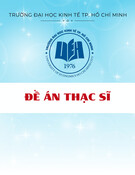MINISTRY OF NATIONAL DEFENSE POLITICAL ACADEMY NguyÔn v¨n quang VU VAN LONG
Emotion management skills of division officers-training cadets at Military Officers-Training Colleges in the Vietnam People’s Army
Specialization: Psychology Studies
Code : 931 04 01
SUMMARY OF DOCTORAL DISSERTATION OF PSYCHOLOGY STUDIES HA NOI - 2019
THE THESIS WAS ACCOMPLISHED AT POLITICAL ACADEMY - MINISTRY OF NATIONAL DEFENSE
Supervisors:
1. Assoc. Prof. Dr. Phan Trong Ngo 2. Assoc. Prof. Dr. Nguyen Van Tuan
Reviewer 1: Reviewer 2: Reviewer 3:
The thesis is defended at the Council of thesis evaluation at
the Academic level in line with the Decision no: /QĐ - HV3 date month year 2019 by the Director at the Political Academy - Ministry of National Defense at.....hour.....date ....month.....2019 The thesis can be found at: - National Library - Military Library - Library at Political Academy
LIST OF THE THESIS-RELATED WORKS PUBLISHED BY THE AUTHOR 1. Vu Van Long (2016), Emotion management skills of officers-training cadets at military schools today, Conference’s Preceding, Vietnam Association of Psychology - Education, December, pp.425-432. 2.Vu Van Long (2017), Factors affecting skill of emotion management of officers-training cadets at military officers- training schools of the Vietnam People’s Army, Journal of Education, Special issue, 6/2017, pp.111, 118-120.
3. Vu Van Long (2017), Factors affecting skill of emotion management of cadets of Section 2 of Political Academy today, Journal of Education and Society, Special issue, 10/2017, pp.66-68. 4. Vu Van Long (2017), Some measures to nurture the ability of control emotion for officers-training cadets at military schools today, Journal of Education and Society, Special issue, 11/2017, pp.352-356.
5. Vu Van Long (2017), Components of emotion management skillS of officers-training cadets at military officers-training schools of the Vietnam People’s Army, Journal of Education and Society, Issue 81 (142), 12/2017, pp.77-79.
6. Vu Van Long (2018), The actual situation of emotion control skills and emotion management skills of cadets of Section 2 of Political Academy today, Journal of Social Psychology, Issue 1, 1/2018, pp.94-104.
7. Vu Van Long (2018), Experimenting measures to develop emotion management skills for cadets at military officers-training schools of the Vietnam People’s Army, Journal of Social Psychology, Issue11, 11/2018, pp.123-132.
1
INTRODUCTION
1. Rationale for the study Emotion plays an important role in our mental life and has a great impact on our work, study, and creativity. When man is happy, he tends to be active, enthusiastic and he often acts positively. When man is sad, worried, disappointed, he tends to be slack, reserved if that kind of feeling lasts too long. When man feels resentful and hatred, he tends to do something that is harmful to him and others as well. Thus, managing emotion in a reasonable way to make our life balanced and harmonious is what everybody pays attention to and wants. Daniel Goleman (2007) claimed that: “Emotion management proves the ability to make our feelings get used to the situation, how man restricts his own emotions. People without this basic psychological ability getting themselves out of worry, sadness, and anger often have to struggle against bad emotions”. Therefore, emotion management does not only mean controlling our actions, biological expressions, or outside attitudes, but it also needs to work out solutions to control emotion, release restricted feelings in time.
Emotion management skill is a type of living skill, playing a very important role in activities, helping man is able to control feeling, and perfect personal quality. Cadets at Military Officer Training Colleges selected from the National Entrance Exams have graduated from high school and are now being trained to become cadres and officers. During the training course, cadets have to carry out many tasks, solve different situations according to the military rules and disciplines. At the same time, the negative side of the market-economy, the social evils, the bad habits often have a negative impact on the cadets. In order to meet the training objectives and requirements as well as to form and develop the personal qualities of the officers, cadets must have living skills in general and emotion management skill in particular to control, adjust emotion; always keep themselves balanced in emotion. Over
the past years, Party Committees, Administrators, functional organizations and units in military officer training schools always pay attention to directing, guiding, building plans and organizing to practise and develop personal qualities, abilities, living skills in general and emotion management skills in particular for the cadets. Cadets have good personalities, firm and steadfast thoughts, good abilities, good working methods and styles, their studying and
2
training results are good; cadets have formed and developed some basic living skills including emotion management skills. However, at military officer training colleges nowadays, living skills in general, and emotional management skills in particular of the cadets still have a lot of limitations. The ability to control and adjust emotions of the cadets is at a certain level, especially in complex situations with a lot of affecting elements, cadets feel confused and are not really flexible and creative to solve the situations in a reasonable way. Currently, the training objectives and requirements of the officer training schools are getting higher and higher. Hence, to meet the above contents, cadets are required to train and develop living skills including emotion management skills. Studying emotion management skills is a complicated issue; up to now there have been many opinions about emotion management skills. The research on emotion management skills is not various; especially in the military environment there has been no deep and systematic research on emotion management skills of the cadets at military officer training colleges. Based on the above theories and realities, the author chose the thesis topic entitled: "Emotion management skills of division officers-training cadets at Military Officers-Training Colleges in the Vietnam People’s Army”.
2. Purpose and tasks of the research * Purposes of the research The dissertation clarifies a number of practical and theoretical issues on emotion management skills of cadets, proposes pedagogic - psychological measures to develop emotion management skills of cadets of military schools.
* Tasks of the research The dissertation gives an overview of foreign and domestic works related to the thesis.
The dissertation analyses, generalizes and systematizes some theories on emotion management skills, building the tool concept of the thesis, identifying signs of emotion management and factors affecting emotion management skills of cadets at military schools. The dissertation evaluates the actual situation skill of emotion management and factors affecting cadets’ emotion management skills. The dissertation proposes pedagogic - psychological measures to develop emotion management skills of cadets of military schools. The dissertation experiments factors affecting skill of emotion management cadets of military schools.
3
3. Object, Subject, Scope and Scientific hypothesis * Object of the study Signs of emotion management skills and factors affecting emotion management skills cadets of military schools.
* Subject of the study Officers-training cadets, teachers and officials managing
cadets at military schools. * Scope of the study - In terms of content: The thesis researches on signs of emotion management skills and factors affecting cadets’ emotion management skills. In addition, it researches on cadets’ emotion management skills in learning, training and communicative relationships at schools.
- In terms of subject: The thesis researches on officials, teachers and cadets at the following military schools: The Army Officers- Training College N1, The Political Officers-Training College, The Officers-Training College of Telecommunication, The Officers-Training College of Commando. - In terms of time: Data and surveys for the study are collected from 2013 to the present.
* Scientific hypothesis Cadets’ emotion management skills is composed of several supporting skills (skill of identifying emotion, skill of controlling emotion, skill of directing emotion, skill of using emotion). Cadets’ emotion management skills is above average, the components skills are not equal, of which skill of identifying emotion is the best, and skill of using emotion is the worse. Cadets’ emotion management skills is formed and shown in studying, training and communicative relationships; being affected by subjective and objective factors. If the theoretical basis is clarified and the actual situation of cadets’ emotion management skills and factors affecting cadets’ emotion management skills are evaluated, then pedagogic - psychological measures to develop skill of emotion management of cadets are proposed, contributing to improve the quality of education, training at military officers-training colleges in the Vietnam people’s Army.
4. Methodology and research methods * Methodology The thesis is based on the thorough understanding of the materialist dialectics of Marxist-Leninist philosophy and the views of President Ho Chi Minh, the Communist Party of Vietnam’s view on
4
education and training, including education and training at military officers-training colleges in the Vietnam people’s Army. It is based on a system of views: view of activity; concrete and historical view; development view.
* Research method The thesis uses a combination of different methods of psychology studies in general and military psychology studies in particular:
In terms of theory: Analysing, generalizing some scientific works related to emotion management skills of cadets at military officers-training colleges in order to form theory of the thesis.
In terms of practice: Method of observation; Method of questionnaires; Method of conversation; Method of interview; Method of experts consult; Method of experiment; Method of multiple choice.
In terms of maths statistics: Use of software SPSS 20.0 to calculate the data of survey, investigation, experiment and showing research results.
5. New contributions of the thesis * In terms of theory The thesis generalizes the theory on emotion management skills and forms some basic concepts: emotion management, skill of emotion management, emotion management skills of cadets at military officers-training colleges. It identifies that the signs of emotion management skills of cadets are shown through 4 component skills (skill of identifying emotion, skill of controlling emotion, skill of directing emotion, skill of using emotion) and factors affecting skill of emotion management of cadets.
* In terms of practice The thesis points out that the actual situation of emotion management skills of cadets are shown in 4 skills: skill of identifying emotion, skill of controlling emotion, skill of directing emotion and skill of using emotion are of above- average level. The worst is skill of using emotion; the best is skill of identifying emotion.
Emotion management skills of cadets is affected by 2 groups of factors: Group of subjective factors and group of objective factors. Of which, group of subjective factors have more impact than group of objective factors. The findings of experiment show that skill of emotion management of cadets at military schools can be promoted by
5
the following pedagogic measure: Nurturing skill of using emotion for cadets at Army N1 Officers-Training College.
6. Theoretical and practical significance of the thesis * Theoretical significance The thesis contributes to supplement and develop the theory on Psychology studies of skill of emotion management and emotion management skills of cadets at military schools. The thesis identifies the basic sighs of emotion management skills of cadets at military schools and points out factors affecting emotion management skills of cadets at military officers-training colleges.
* Practical significance The thesis provides the scientific basis for promoting emotion management skills of cadets, contributing to improve the quality of cadets at military officers-training colleges. It can also be used as references for researching on emotion management skills in general and researching, educating and supervising officers-training cadets at military officers-training colleges in particular.
7. Structure of the thesis The thesis includes: Introduction, Overview, The content consists of 4 chapters (11 periods), Conclusion, List of References and Appendixes.
Chapter 1 LITERATURE OVERVIEW OF RESEARCHES RELATED TO THE THESIS TOPIC
1.1. The foreign works related to the thesis topic 1.1.1. The works on emotion * The works on emotion as phenomenon of individual psychology Here are typical authors: Cruchetxki V. A. (1982), Rubinxtein X. L. (1960), Carrol E. Izard (1992), Vugotxki L. X. (1997), Goderfroid Jo. (1998), Nicky Hayes (2005), Richard J. Gerrig and Philip Zimbardo G. (2003), etc. In their works, the authors research on issues of emotion definition, sign, stable level, appearance and origin of emotion, classifying emotion and impact of emotion on personal activities. * The works on emotion as a driving force for individuals in working and their life
Typical authors: Skinner B. (1953), Maslow A. (1970), Strongman K.T (1987), Carrol E. Izard (1992), Maurice Reuchlin (1995), Keith Oatley & Fennifer Jenkins M. (1995), Goderfroid (1998), Freud S. (2002), Nicky Hayes (2005), Helen Greathead (2007), Daniel Goleman (2002, 2015),
6
James L. Gibson (2011), Virender Kapoor (2012), Richard J. Gerrig and Philip G. Zimbardo (2003), etc. In these above works, emotion is seen as a driving force for individuals to act. Therefore, how to maintain, satisfy or strengthen personal emotion is of great importance.
1.1.2. The works on emotion management In terms of emotional intelligence, which includes the factors of being conscious and controlling of the self and of others, there are works on emotion management. Typical works: Fischer, Manstead, Evers, Timmers & Valk (2004), Wegner and Therriault (1996), Diamond & Aspinwall (2003); Michelle Sams (2010). The authors points out the signs of emotions and causes of these emotions. 1.1.3. The works on emotion management skills * The works on emotion management skills as one basic factor and component in emotional intellect
the
representatives there are three
Emotion intelligence is a recent psychological phenomenon appeared in the end of the 20th century. The appearance of emotion intelligence has changed traditional concept of emotion intelligence and has widely affected several fields of life. The research on emotion intelligence started in America with such experts as: Bar-On R, Salovey and Mayer in 2007, Goleman, etc. Generally speaking, researching emotion intelligence in different ways: Bar-On R. touched upon emotion intelligence under the perspective of personal manner; Salovey and Mayer under the perspective of consciousness; Daniel Goleman under the perspective of the work efficiency. In this thesis, we touch upon emotion intelligence according to the view of Daniel Goleman. * The works on emotion management skills as a communicative skill
Soviet psychologists have made an important contribution researching in communication in general and communicative skill in particular, especially pedagogical communication. Typical authors: Cubanova, Dakharo, Leonchiev, etc. In psychology studies in America, there are a number of authors researching in art of communication, communicative skill in management and business such as: Allan Pease (1994), Torrington and his fellows (2004). * The works on building measurement to identify skill of emotion management
Here are typical works: Emotion control questionnaires (ECQ2) by Roger D. and Najarian B. (1989). These questionnaires
7
consist of 56 items, divided into 4 categories (14 items in each category) with 4 areas. Emotional Quotiet Inventory, 1997. This measures stress control and management. Nowadays, another measurement is widely used in research in TTCX, that is MEIS by Mayer, Salovey and Caruso (2000) designed to measure 4 factors making up EI, with the ability to control emotion (item 4). However, these measurements are focused on identifying the general skill of emotion control, not on specific emotion.
1.2. The domestic works related to the thesis topic 1.2.1. The works on emotion Emotion is researched by several psychologists in Vietnam, typically: Vu Dung (2008), Do Manh Ton (2006), Nguyen Quang Uan (2004), Ngo Cong Hoan (2003), Nguyen Huy Tu (2003), Nguyen Khac Vien (2003), Nguyen Ngoc Phu (1998), Nguyen Dinh Sang (2015), etc. These authors believe that emotion is the indispensible product of the process of satisfying human’s basic necessity. Emotion is the feeling shown when being affected by other factors. 1.2.2. The works on emotion management skills * The works on skill of emotion control as a component of emotional intelligence
The term “Emotional intelligence” was officially mentioned at the conference of Social Science at the State level KX-07 by Pham Minh Hac (chief editor) in 2001. Emotional intelligence - essence and ways of measurement” by Nguyen Huy Tu (2003). The work at the State level, code KX-05-06 in the 2001 - 2005 period by Tran Kieu and Vietnamese psychologists and educationists of Institution of Strategy and education Program. Emotional intelligence is seen as one of three factors of intelligence. This serves as a favourable condition for the author to do research on skill of emotion management of cadets. * The works on emotion management skills as basic communicative skills
There are a number of works on communicative skills on different objects and areas such as: pedagogic communication; communication and negotiation in leadership; art of communication in tourist business; communication of military doctors with patients; communication of political instructors in the Vietnam People’s Army, etc. Typical authors: Hoang Anh (1993), Nguyen Van Thac (1992), Nguyen Thi Thanh Ha (2000), Nhu Van Thao (2012), etc. Generally, these authors indicate that the skills of controlling
8
communicative process (manage and control personal emotion) is one components of communicative skill.
* The works on emotion management skills as a kind of life skill In recent years, emotion management skills is considered as one kind of life skill, one field of educating life skill for pupils and students at schools and students support centre. Typically: Nguyen Quang Uan, Huynh Van Son, Nguyen Thanh Binh, Kim Ngoc Dai, etc. The contents of education and training contain emotion management skills or skills of controlling personal emotion and is considered as one life skill needs educating so as for people to perfect themselves, meeting the demand of social development and international integration. * The works related to emotion management skills of cadets at military officers-training colleges
In Vietnam, there are limited numbers of works on emotion management skills, focusing on emotion management skills of cadets, students at pedagogic universities, typical authors: Huynh Van Son, Tran Thi Thu Mai, Nguyen Thi Hai, Nguyen Ba Phu, Ta Quang Đam, etc. There are some works on this field but limited to emotion management skills. These authors present skill of emotion self-management, assessing the actual situation and factors affecting thoroughly and completely. 1.3. Generalization of the research results of published scientific works and the focussed issues of the thesis 1.3.1. Generalization of the research results of published scientific works
For emotion, there have been many studies of domestic and foreign researchers on emotion approached from different angles and on different subjects and objects. At the same time, domestic and foreign researchers show different schools and opinions in their studies. For emotion management, emotion management skills, foreign researchers have many studies on emotion management, emotion management skills, and their way to study is very clear and coherent. Domestic studies on emotion management skills are limited in number and the studies are mainly through TTCX and living skills. In the field of military operations, there have been some studies on the emotion management skills and emotion control of lecturer training cadets and cadets at military officer training colleges. The results of the mentioned studies on emotion management skills are very valuable and various sources that the author can exploit and refer to and inherit in order to fulfil this thesis.
9
1.3.2. The focused issues of the thesis In this thesis, the author will continue to study and solve some of the problems as follows: For emotion management skills, domestic and foreign psychologists have different opinions. However, the tendency to consider emotion management skill as a type of living skills, the complex skill was chosen and studied to justify and make clear this opinion in studying emotion management skills of the cadets.
identify the component skills of
factors affecting the
Psychologists have different approaches to the emotion management skills and they have pointed out different skills of emotion management skills. Based on the studying and training activities of the cadets at Military Officer Training Colleges, the author considered the cadets’ emotion management skill a process to the cadets’ emotion management skill. The objectives of the thesis is focus on clarifying the expressions of the emotion management skills of the cadets at Military Officer Training Colleges; identifying the evaluating criteria and the emotion management skills of the cadets to make the foundation for the reality survey and evaluation.
Developing the emotion management skill of the cadets, the objectives of the thesis is not only clarifying the theories but also studying, surveying the reality, and evaluating the reality of this skill. The emotion management skill of the cadets is affected by many objective and subjective factors. Therefore, it is necessary to study and analyse the factors affecting the cadets’ emotion management skill. At the same time, to check the effect of the suggested measures, the study needs to carry out experimental testing on a measure in random to prove its impact on developing the cadets’ emotion management skill at Military Officer Training Colleges in the Vietnam People’s Army. Summary of chapter 1
By generalizing domestic and foreign studies relating to the topic of the thesis, the author assumed that the emotion management skill of the cadets at officers’ schools has not received adequate attention from the researchers both on the aspects of theory and practice. With the special characteristics of studying, training, and living, the relationships at Military Officer Training Colleges in the Army require the higher and higher standard of physical strength, the
10
intense psychology, which is one of the main causes of the bad emotions among the cadets. Thus, the topic of the thesis is of great practicality and significance.
Emotion management skill is approached from different angles. However, there have not been many studies on emotion management skill in general, and on emotion management skill of cadets at military officer training colleges in particular. The results of these studied are diverse and useful sources that the author can exploit, refer to, and inherit in order to fulfil the thesis.
Chapter 2 THEORIES ABOUT EMOTION MANAGEMENT SKILLS OF DIVISION-OFFICER TRAINING CADETS AT OFFICER TRAINING COLLEGES IN THE VIETNAM PEOPLE’S ARMY
2.1. Emotion management skill 2.1.1. Emotion * Definition of emotion: Emotion is the vibration that shows people’s attitudes toward things and phenomena related to their needs and motives.
* Classification of emotion Focus on analysing the 6 basic types of emotion as follows: happy, miserable, fearful, angry, surprised, and scornful.
2.1.2. Skill Skill is the application of the available knowledge and experience to the reality to achieve an identified goal.
2.1.3. Emotion management skill 2.1.3.1. Emotion management * Definition of emotion management Emotion management is the process of identifying, controlling, directing, and using our emotions affected by the situation in order to help individuals master their own emotion. * Distinction between emotion management and emotion intelligence
Emotion management and emotional intelligence are similar in the way that they both refer to the appearance of emotion; people can identify, control, direct, and use it. The content of these two concepts has something in common. However, there are still differences between emotion management and emotional intelligence: emotional intelligence has a
11
wider range; it is a very popular psychological phenomenon like a quality, a character, ability in everyday activities and communication of human. Emotional intelligence is always present in individuals. Emotion management is a process and it can be present or not.
2.1.3.2. Emotion management skill * Definition of emotion management skill Emotion management skill is the use of the available knowledge and experience to identify, control, direct, and use individual emotion when there is an impact to master our own emotion in real activities.
* Component skills of emotion management skill Based on the results of the above-mentioned studies, the definition of emotion management skill, the author assumes that emotion management skill consists of the following component skills: emotion identifying skill; emotion controlling skill; emotion directing skill; emotion using skill. 2.2. Emotion management skill of division-officer training cadets Military Officer Training Colleges
2.2.1. An overview of Military Officer Training Colleges and the characteristics of division-officer training cadets at Military Officer Training Colleges 2.2.1.1. An overview of Military Officer Training Colleges in the Vietnam People’s Army 2.2.1.2. The characteristics of division-officer training cadets at Military Officer Training Colleges
* Cadets at Military Officer Training Colleges * The characteristics of cadets at Military Officer Training Colleges
- The bio-psychological characteristics. - The socio-psychological characteristics. * The characteristic features of the studying and training of cadets at Military Officer Training Colleges
- Cadets are carefully selected based on the entrance exam result, and they study and train in a pedagogical and military environment in accordance with the regulations and disciplines in the Army.
- The studying and training activities of the cadets are intense in the aspects of the mentality and physicality due to the strict requirements of the future career.
12
- The studying and training activities of the cadets at Military Officer Training Colleges are well organized in a pedagogical and military environment. 2.2.2. Emotion management of division-officer training cadets at Military Officer Training Colleges
* Emotion of division-officer training cadets Emotion of division-officer training cadets is the vibrations that show their attitudes to things and phenomena related to their needs and motives. * Definition of emotion management of division-officer training cadets
Emotion management of division-officer training cadets is the process of identifying, controlling, directing, and using their emotions to help them master their own emotions during the studying process and meet the communicative goal, and the school requirements. 2.2.3. Emotion management skill of division-officer training cadets at Military Officer Training Colleges 2.2.3.1. Definition of emotion management skill of division- officer training cadets at Military Officer Training Colleges
Emotion management skill of cadets at Military Officer Training Colleges is the use their knowledge and experience to identify, control, direct and use their own emotion when being affected in order to help them master their own emotions during the process of studying, training, living and communicating to meet the training goal and requirement of the schools.
2.2.3.2. Expression of the emotion management skill of the division-officer training cadets at Military Officer Training Colleges
- The emotion identifying skill of the cadets - The emotion controlling skill of the cadets - The emotion monitoring skill of the cadets - The emotion using skill of the cadets 2.3. Factors affecting the emotion management skill of division-officer training cadets at Military Officer Training Colleges
2.3.1. Objective factors: The impact of socio-economic condition; The cultural pedagogical military environment; The aims, the requirements and the content of the training programme; The qualities, the abilities, the methods, the styles of cadres and lecturers; The pressure of the study and examination.
13
2.3.2. Subjective factors: The knowledge and experience of the cadets; the temper of the cadets; the health and the spirit of the cadets; the methods of studying and training of the cadets; the military career tendency of the cadets. Summary of chapter 2
In this thesis, emotion management skill of the cadets at Military Officer Training Colleges is defined as the use of their knowledge and experience to identify, control, direct, and use their emotion when being affected to help cadets master their own emotion during the process of learning, training, living, communicating to meet the training goal and requirement of the schools.
Emotion management skill of the cadets at Military Officer Training Colleges in the Vietnam People’s Army consists of four component skills: emotion identifying skill; emotion controlling skill; emotion monitoring skill; emotion using skill. Many factors, including subjective factors as well as objective factors, affect emotion management skill of the cadets at Military Officer Training Colleges. The effects of these factors on the emotion management skill of the cadets at Military Officer Training Colleges are different from each other.
Chapter 3 RESEARCH ORGANIZING AND METHODOLOGY 3.1. Research organizing 3.1.1. Research units The research was carried out in 4 units: The Army Officers- Training College No1, The Political Officers-Training College, The Engineering Officers-Training College, and The Military Officers- Training College of Telecommunication from 2015 to 2018.
3.1.2. The object of the study TThhee oobbjjeecctt ooff tthhee ssttuuddyy ccoonnssiissttss ooff 339966 ccaaddeettss,, 112277 ccaaddrreess aanndd lleeccttuurreerrss..
3.1.3. The content of the study Study the reasoning problems about emotion management skill in general and the emotion management skill of cadets in particular.
Survey, evaluate the real situation of the emotion management skill of the cadets at military officer training colleges today. Based on the results of the study, propose some pedagogical-psychological measures to develop the emotion management skill for cadets at military officer training colleges.
14
Test the effect of the measures developing the degree of the emotional management skill of the cadets at military officer training colleges.
3.1.4. The stages of the study Stage 1: Study the theories and do a preliminary survey, complete the detailed thesis proposal. Stage 2: Survey the situation, conduct impact experiments, and write the contents of the thesis. Stage 3: Check the survey statistics and continue to supplement the thesis content. Stage 4: Complete the thesis. 3.2. Criteria for evaluating the degree of emotion management skill of cadets at military officer training colleges
Criteria for evaluating the degree of emotion management skill of cadets are based on the expressions of the component skills of emotion management skill of the cadets. 3.3. Research methodology In this thesis, the author has combined different methodologies to study as follows: document study, survey questionnaire, observation, in-depth interview, group discussion, experimental method, expert method and the data analysis method by using SPSS 20,0 software: analysis using descriptive statistics, analysis using inference statistics, and factor analysis.
Summary of chapter 3 To study the situation of emotion management skill of cadets at military officer training colleges in the Army, the author carefully prepared the studying process and used various studying instruments. Therefore, during the process of surveying the situation and conducting the experiment, a lot of difficulties arisen subjectively or objectively were limited. A smooth combination of different study methodologies promoted their effect, helping to measure the situation of emotion management skill of cadets accurately. The findings were qualitatively authentic, valuable, help to make clear the quantitative findings collected and analysed by using SPSS 20.0 software. The measurements used in the thesis have been adapted to the civilian environment and are now applied to the military environment, these measurements have been supplemented with the characteristics of the cadets at military officer training colleges as the object of the study; therefore, they ensure the reliability when applied to the study to decide on the judgement and evaluation in the thesis.
15
Chapter 4 THE FINDINGS OF THE SITUATION OF THE EMOTION MANAGEMENT SKILL OF DIVISION-OFFICER TRAINING CADETS AT MILITARY OFFICER TRAINING COLLEGES IN THE VIETNAM PEOPLE’S ARMY 4.1. The situation of the emotion management skill of division- officer training cadets at military officer training colleges 4.1.1. A general evaluation of the situation of the cadets’ emotion management skill
In this thesis, the author studied the degree of emotion management skill of cadets basing on the cadets’ self-evaluation of their four component skills: emotion identifying skill, emotion controlling skill, emotion monitoring skill, and emotion using skill, the findings are presented in table 4.1 below: Table 4.1. Emotion management skill of cadets
TT 1 2 3 4
Skills Self-evaluation of cadets’ emotion identifying skill Self-evaluation of cadets’ emotion controlling skill Self-evaluation of cadets’ emotion directing skill Self-evaluation of cadets’ emotion using skill
Cadets’ emotion management skill
ĐTB ĐLC 0.41 3.71 0.42 3.67 0.34 3.61 0.35 3.50 0.58 3.62
The results of the study show that the cadets’ emotion management skill is at good level (ĐTB = 3.62; ĐLC = 0.58). Of component skills, the cadets’ emotion identifying skill is the best (ĐTB = 3.71; ĐLC = 0.41); next is the emotion controlling skill (ĐTB = 3.67; ĐLC = 0.42); the third place is the emotion directing skill (ĐTB = 3.61; ĐLC = 0.34) and the lowest is the emotion using skill (ĐTB = 3.50; ĐLC = 0.35).
The testing results show that there are 6 correlations among the 4 component skills and they are all positive. Four of six are closely positive, including: correlation between emotion identifying skill and emotion controlling skill (r = 0.423**), correlation between emotion controlling skill and emotion directing skill (r = 0.477**), correlation between emotion directing skill and emotion using skill (r = 0.559**) and correlation between emotion controlling skill and emotion using skill (r = 0.456**). At the same time, there are two loosely positive correlations: between emotion identifying skill and emotion directing skill (r = 0.280**), between emotion identifying skill and emotion using skill (r = 0.201**). This result shows that although belonging to the
16
component skills of emotion management skill of cadets, any increase or decrease in one skill will lead to the increase or decrease in the other.
The differences
in emotion management skill between different groups of cadets through Independent Samples Test and One - way ANOVA in combination with in-depth Post Hoc Tests (Bonferroni). The results are presented in the table below:
Table 4.2. The relationship between different object groups on emotion management skill
Content
t/F
p
Already learned
t-test, 0ne - way anova
Emotion management skill ĐTB ĐLC 0.52 3.82
t (394) = 8.225 0.000 (< 0.05)
Not yet learned
3.53
0.57
t (521) = 26.550 0.000 (< 0.05)
Learn emotion management skill Object groups
3.62 3.53
0.49 0.48
3.34
0.54
3.54
0.60
F(3,392) = 128.62
0.000 (< 0.05)
3.76
0.58
Cadets of different school years
3.90
0.50
F(4,392)= 367.92
Different types of temper
0.000 (< 0.05)
Cadets Cadres and lecturers The first-year cadets The second-year cadets The third-year cadets The fourth-year cadets Hot Active Quiet Thoughtful Mixed
3.21 3.71 3.76 3.17 3.63 The lowest group 3.17
0.61 0.40 0.47 0.57 0.43 0.58
3.47
0.65
The second lowest group
F(4,391)= 299.94
0.000 (< 0.05)
The average group 3.78 3.95
0.53 0.60
Self- evaluation of the studying and training results
The second highest group The highest group
4.16
0.54
17
There have been significant differences between cadets who have learned emotion management skill and cadets who have not learned that skill, t (394) = 8.225 and p = 0.000 (< 0.05); the previous groups of cadets have better emotion management skill than the following groups of cadets; there have been significant differences between cadets who have different types of temper, besides, there is no difference in emotion management skill between the group of cadets who are quiet and the group of cadets who are thoughtful (p = 0.600 > 0.05); cadets with good emotion management skill often have better results of studying and training.
The results of the relationship between the studying and training results and the emotion management skill of the cadets through Chi-Square Tests show that: P = 0,000 (< 0.05), proving that they have relation with each other, the emotion management skill of the cadets has an important role in their studying and training situation and it is the foundation for them to do their tasks according to their position after graduation. Table 4.3. Cross correlations between the degree of emotion management skill and the studying and training result of the cadets
The studying and training result
Content
Total
The low studying and training result 190
The high studying and training result 9
199
95.5
4.5
100
Low emotion management skill
88.0
50.3
5.0
N Emotion management skill (%) Studying and training result (%)
48.0 26
50.3 197
2.3 171
Degree of emotion managem ent skill
13.2
86.8
100
High emotion management skill
12.0
95.0
49.7
N Emotion management skill (%) Studying and training result (%) N
6.6 216
43.2 180
49.7 396
Sum
54.5
45.5
100
100
100
100
Emotion management skill (%) Studying and training result (%) % of sum
54.5
45.5
100 It can be confirmed that emotion management skill of cadets at officer training schools plays an important role in the reality of the studying and training of the cadets and is the foundation for them to do their tasks according to their positions after graduation. There have been differences in emotion management skill of groups of cadets with different temper types, different school years, and different studying and training results; or the evaluation of cadres and teachers and the self-evaluation of the cadets. In the next part of the thesis, the author will make clearer the situation of emotion management skill of cadets by analysing the four component skills: emotion identifying skill, emotion controlling skill, emotion directing skill and emotion using skill.
18
4.1.2. Real situation of expression degree of emotion management skill of cadets
4.1.2.1. Real situation of emotion identifying skill of cadets The emotion identifying skill of the cadets are at good level (ĐTB = 3,71, ĐLC = 0,41). In which, 5/6 emotions are identified at good level and one is identified at average level. Correlations between the emotion identifying skills of the cadets through situation and self-evaluation are positive and relatively close (r = 0,428** and p = 0.000). Development degree of emotion identifying skill depends on the time of studying and training at school; there are significant differences among cadets of different school years; and differences among cadets who have learned and not learned emotion management skill.
4.1.2.2. The real situation of emotion controlling skill of cadets The emotion controlling skill of cadets is at good level (ĐTB = 3,67; ĐLC = 0,42), however, there is still some at average level. The results from different research methodologies are the same. High-level research results have positive correlations low-level research results are between self-evaluation and the result of the situational exercises on
19
emotion controlling skill of the cadets. There have been significant differences between cadets with different studying and training results; there have been significant differences in emotion controlling skill between cadets of different school years.
4.1.2.3. The real situation of emotion directing skill of cadets The emotion directing skill of the cadets is at good level, ĐTB = 3.61 (ĐLC = 0.34). This level is presented in all items measured on the measurement scale (ĐTB from 3.46 to 4.05). Cadets of the previous year have better emotion directing skill than those of the following year. The groups of the first year cadets have emotion directing skill at average level. Cadets who have learned emotion management skill have better emotion directing skill than the group of cadets who have never learned this skill. The differences are all of statistical significance.
4.1.2.4. The real situation of emotion using skill of cadets The emotion using skill of cadets is at good level (ĐTB = 3.50; ĐLC = 0.35). Four out of 6 items measured are at good level and 2 items are at average level. There has been low positive correlation between cadets’ self-evaluation and their emotion using skill through situations. There has been significant difference in emotion using skill among different groups of cadets of different school years; similarly, there has been difference among groups of cadets with different studying and training results of emotion using skill.
In general, the emotion management skill of the cadets is at good level, representing in four component skills. Of the four component skills, the best is emotion identifying skill and the worst is emotion using skill. There has been positive correlation between component skills and general emotion management skill, ranging from closely related to very closely related. There has been significant statistic difference in types of temper among different groups of cadets; among cadets of different school years and among cadets of different studying and training results. There has been closely positive correlation between the studying and training result and the emotion management skill of the cadets. Cadres and lecturers’ evaluation on cadets’ emotion management skill was lower than the cadets ‘self-evaluation.
20
4.2. The real situation of factors affecting the career success need of young officers in the Vietnam People’s Army
4.2.1. Objective factors Objectives factors have had a great impact on the emotion management skill of the cadets (with average score = 3.80 and ĐLC = 0.60). The items measured all represented this level. Cadets who highly appreciated the impact of this objective factor would also highly appreciated the impact of the other objective factor and vice versus. The cadets’ emotion management skill was affected by pressure from examinations and tests the most (with the average score = 4.07 and ĐLC = 0.72); at the same degree of impact, however, the lowest average score and high dispersion are due to the impact of socio-economic condition on cadets’ emotion management skill (with the average score = 3.56 and ĐLC = 1.05).
4.2.2. Subjective factors Subjective factors affecting the cadets’ emotion management skill are at good level (ĐTB = 3.82; ĐLC = 0.57). All the items measured showed this result. Cadets who highly appreciated this subjective factor would highly appreciate the impact of the other subjective factor at different levels. Cadets claims that some outstanding factors were life experience, living experience and experiences (ĐTB = 3.99; ĐLC = 0.78), and the method of studying and training (ĐTB = 3.83, ĐLC = 0.77) were the factors that affected emotion management skill more dramatically. This leads to a suggestion that we should develop emotion management skill for cadets, and attention should be paid to emotion management skill and the methods of studying and training of cadets at military officer training colleges.
4.3. Pedagogical-psychological measure to develop emotion management skill for division-officer training cadets at military officer training colleges
to develop
Based on the results of theoretical and practical study on emotion management skill of cadets, the researcher suggested 4 emotion pedagogical-psychological measures management skill for cadets at military officer training colleges in the Vietnam People’s Army. 4.3.1. Educate to raise the cadets’ awareness about emotion management skill in improving the quality of education the and training at military officer training colleges. 4.3.2. Renew content and method of teaching; form of examination and testing to develop emotion management skill for cadets. 4.3.3. Create situations in studying, training, and communicating to train emotion management skill for cadets. 4.3.4. Raise the positive and the proactive of cadets in
21
the process of training, developing emotion management skill. 4.3.5. Build a positive cultural environment to create condition for cadets to train and develop emotion management skill.
is completely appropriate, ensuring to experiment 4.4. Analysing the experimental results 4.4.1. The results of the survey before experiment The testing results of Independent Samples T test showed that: t (394) = 0.348 and P = 0.78 (>0.05), there was no difference in emotion using skill between the experimental group and the rest of cadets in the Samples. The testing results of Independent Samples T test also showed that there was no significant difference in emotion identifying skill, emotion controlling skill and emotion using skill between the experimental group and the rest of the cadets. This confirms that the selection of a group of cadets the representative for the whole samples in the study.
4.4.2. The results of the survey and test after the experiment After the process of experiment, the degree of emotion using skill of cadets belonging to the experimental group increases considerably and the most dramatically (ĐTB: 3.65 → 4.20, the degree of difference is 0.55. In order to find out if this change is of significance in statistics or not, the author carried out testing Paired samples T test. The result showed that t (39) = -9.245, p = 0.000 (>0.05) proving that there has been significant statistic difference in emotion using skill of the experimental group before and after the experiment. In other words, after experiment, emotion using skill of the experimental group has improved significantly.
Chart 4.6. Emotion management skill of cadets in the experimental group before and after the experiment
22
The above results show that emotion using skill of the experimental group has improved after the experiment, creating significant development in comparison with itself and with NDC as well. NĐC itself, emotion using skill measured after the experiment has recognizable change. This also happened to component skills and emotion management skill itself of the experimental group and NĐC.
4.4.3. Some findings from the analysis of the experiment results Together with emotion management skill, the emotion using skill of the cadets developed in a regular way and was affected by subjective and objective factors pointed out in the thesis. If the cadets’ emotion using skill is enhanced in accordance with the rule of development, the emotion using skill will be developed in particular and the emotion management skill is also developed in general. Pedagogical and psychological measures to develop emotion management skill for cadets recommended are scientifically based both in theory and in practice, and they are highly feasible. The process of carrying the experiment ensured the characteristics of being objective and scientific and the collected results reflected the real situation of the study object. Summary of chapter 4
Emotion management skill of cadets at military officer training colleges is at good level. Of the four component skills, emotion identifying skill is the best, and emotion using skill is at the lowest level. Component skills are in a positive correlation and they are from closely related to very closely related. There are many factors affecting cadets’ emotion management skill, including two main groups: the group of objective factors and the group of subjective factors. In order to develop emotion management skill for cadets it is necessary to impact on these influencing factors by using the system of pedagogical and psychological measures recommended. The results of the testing experiment show that there has been an increase in the development of emotion using skill of cadets. This proves that the situational study and recommended measures are right and the measures are highly feasible.
23
CONCLUSION AND RECOMMENDATIONS
1. Conclusion Living skill in general and emotion management skill in particular plays a very important role and is essential for cadets who are studying, training, living and communicating at military officer training colleges. Studying emotion management skill of cadets at military officer training colleges is of great significance both in theory and practice. Based on the collected results of the study on emotion management skill of cadets at military officer training colleges, the author realized that:
1.1. Overview of research situation shows that emotion management skill of cadets at military officer training colleges in the Vietnam People’s Army has been studied by some authors, it is not systematic and logic in both theoretical aspect and practical aspect, the angles of approach are also different.
1.2. Emotion management skill of cadets is the use of knowledge and experience to identify, control, direct and use their own emotion when being affected to help them master their own motion during the process of studying, training, living and communicating to meet the object and the requirement of colleges. This is an important skill to help cadets complete the training object and requirement of military officer training colleges. The results of the study show that the practice of this skill is at good level and there are differences in the level of emotion management skill of cadets of different school years. 1.3. Expression of emotion management skill of cadets includes 4 skills: emotion identifying skill, emotion controlling skill, emotion directing skill, emotion using skill. Of these four skills, emotion identifying skill is the best; at the lowest level lies emotion using skill, but only emotion management skill and emotion identifying skill is in closely positive correlation.
1.4. There are two groups of factors affecting emotion management skill of cadets: the group of subjective factors and the group of objective factors. Of these two groups of factors, the important factors creating the influence of the subjective group consist of: knowledge, experience, method of learning and training of cadets...; in the objective groups, it includes: studying and testing pressure, quality, ability, working method and working style of staff and lecturers, the object, the requirement and the content of the training programs, ....
24
1.5. Five pedagogical-psychological measures are recommended to develop emotion management skill for cadets at military officer training colleges in the Vietnam People’s Army. Testing experiment showed that the practice of the above measures is appropriate and feasible to develop emotion using skill for cadets at military officer training colleges.
2. Recommendations 2.1. To Units - The Ministry of National Defence (Department of Schools/ General Staff, Department of Propaganda/ General Department of Politics)
Standardize the content of division-officer training programs at military officer training colleges in the Vietnam People’s Army, ensuring an overall knowledge content, focusing on the knowledge that help to develop good quality of a cadre and an officer in the future Add the subject of living skill education (soft skill), including emotion management skill to the content of training program.
2.2. To military officer training colleges The results of the study show that in develop emotion management skill for cadets at military officer training colleges it is necessary to open training classes to improve living skill in general and emotion management skill in particular for cadets in different forms.
to follow
2.3. To lecturers and cadet management staffs Lecturers need to be close in understanding cadets’ emotional, cognitive, and thought developments in relation to their emotion, and set good examples for cadets in behaviour and communication, especially lecturers who teach socio-humanity subjects. In teaching, it is necessary to combine providing special knowledge with training positive emotion management skill, training emotion controlling ability, especially controlling negative emotions, learning how to release emotion effectively
Cadet management staffs need to pay more attention to emotional life of cadets. Pay attention to and keep track of unexpected emotions to interfere in time. Organize and diversify outside-class activities for cadets to develop emotion management skill.


























